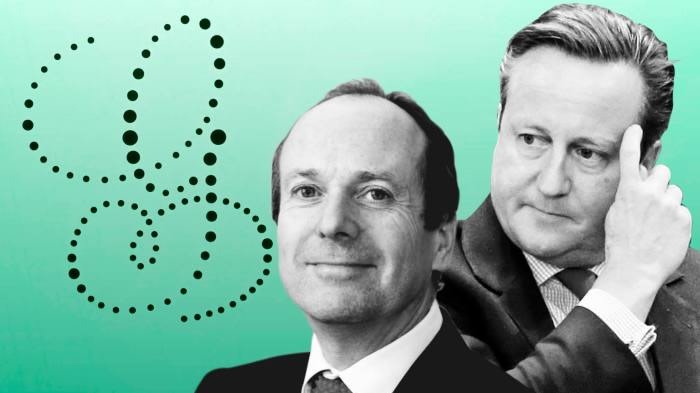Politics class: Greensill affair exposes opaque UK lobbying rules

Roula Khalaf, Editor of the FT, selects her favourite stories in this weekly newsletter.
This article picked by a teacher with suggested questions is part of the Financial Times free schools access programme. Details/registration here.
Specification:
AQA Component 1, Section 3.1.2.4: Pressure groups: other influences on government and Parliament: think tanks, lobbyists, corporations, media.
Edexcel Component 1, Section 1.3: Pressure groups and other influences: other collective organisations including think tanks, lobbyists and corporations, and their influence on government and Parliament.
Background: what you need to know
The articles discuss the political fallout from recent revelations that former Prime Minister David Cameron lobbied former government colleagues on behalf of Greensill Capital, a finance company for which he worked before its collapse in March 2021. Although there is no suggestion of any illegal activity, the story raises concerns about transparency, as lobbying activity of this kind is not all on public record.
It has also come to light that the government’s chief procurement officer took a part-time job with Greensill before leaving his job as a civil servant. Both articles recognise that lobbying is a legitimate activity, providing necessary links between government and business. However, there is a concern that influence may be obtained by those with privileged connections, without proper accountability.
The third article, entitled ‘The David Cameron scandal: just how sleazy is British politics?’ provides a longer view of the issues of integrity and transparency, extending back to the premierships of John Major and Tony Blair. The so-called ‘Tory sleaze’ which contributed to the former’s 1997 electoral defeat has been referenced by Keir Starmer in the debate on Greensill. This article also mentions the 2009 MPs’ expenses scandal and allegations, under more than one government, that individuals have been nominated to the House of Lords in return for making political donations. Terms such as ‘cronyism’ and ‘chumocracy’ evoke a political culture in which favours are distributed within an elite circle of people who are known to each other.
Click to read the articles below and then answer the questions:
Greensill affair exposes opaque UK lobbying rules
Greensill exposes UK’s lobbying problem
The David Cameron scandal: just how sleazy is British politics?
Depending on which examination board you are following, answer one of the following questions.
Question in the style of AQA Politics Paper 1
Explain three ways in which pressure groups such as think tanks, lobbyists or corporations seek to influence government policy in the UK. (9 marks)
Question in the style of Edexcel Politics Paper 1
Evaluate the view that pressure groups, such as think tanks, lobbyists and corporations, exercise undue political influence within the UK democratic system.
You must consider this view and the alternative to this view in a balanced way. (30 marks)
Graham Goodlad, St John’s College
Comments